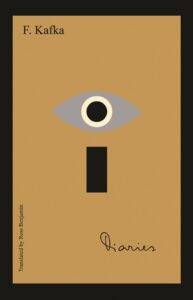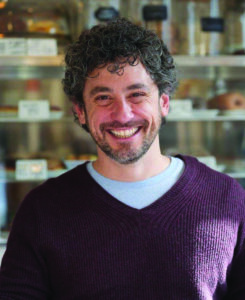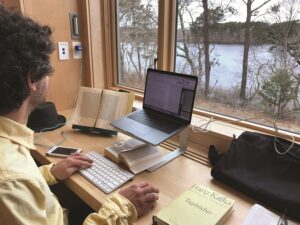EASTHAM — When the German-speaking Czech writer Franz Kafka died in 1924 from tuberculosis, he ordered his close friend and literary executor Max Brod to burn all his work.
Brod, believing in the literary genius of his friend’s writing, defied Kafka’s last wishes and took it upon himself to edit and publish Kafka’s later writing. Brod sifted through the thousands of unpublished pages Kafka bequeathed to him, publishing manuscripts of some of Kafka’s most celebrated works, including the novels The Castle and The Trial. He also published a collection of diaries the author wrote from 1909 to 1923.

But Brod’s editorial interventions were heavy-handed, refashioning Kafka’s disorderly musings into straightforward and facile prose. Passages with sexual imagery and homoeroticism were bowdlerized, and unflattering renderings of both Kafka and Brod were excised to create a more polished, saintly representation of Kafka to be preserved for posterity.
When Brod died in 1968, German scholars revisited Kafka’s original texts, restoring unexpurgated renditions of the author’s work, and English translations of these editions soon followed. But a German-language edition of Kafka’s uncensored diaries published in 1990 never made it into an English translation. Until now.
Ross Benjamin’s 2023 translation of The Diaries of Franz Kafka is the first unexpurgated English edition of the journals, published more than three decades after the complete text emerged in German. Benjamin’s eight-year effort to translate more than 700 pages of Kafka’s writing will be the subject on May 27 when Benjamin discusses his work with author David Means at the Eastham Public Library — the same place where Benjamin completed the final pages of the translation.
Before Benjamin knew he wanted to be a translator, he knew he wanted to read Kafka’s work in its original form. Benjamin, who lives in Nyack, N.Y. and frequently visits Eastham, discovered Kafka in high school. “He rose to the top of the firmament of writers I was excited by,” Benjamin says. Benjamin and his friends would sit in the school library reading Kafka aloud to each other. They found the writer’s themes of alienation and anxiety familiar while appreciating the humor that suffuses even Kafka’s darker works.

“We were always uproariously laughing while reading to each other,” Benjamin says. “The comic elements of the horrific stories really came through. That tension between horror and humor really stayed with me.”
Benjamin went to Vassar and spent part of his college years in Prague, where Kafka grew up, “to trace his footsteps,” he says. There, he began studying German. “I was mainly interested in being able to read in German,” he says. “I didn’t know that the interest would take off from there.”
During a year in Berlin after college on a Fulbright scholarship, Benjamin became immersed in the language and soon began reading Kafka in German. But the editions he found were not Brod’s but those of the later scholars who published the writer’s work in its unfiltered glory. The versions Benjamin had read in English were nothing like the ones he read in German.
“I thought I was learning German so I could read what I had read in English,” says Benjamin. “Instead, what was available in German were the more faithful renditions of what Kafka actually wrote.”
Then he read the later edition of Kafka’s diaries in German, which was a “complete revelation,” he says. “All of a sudden there was this material that I had never seen before that was presented in a much more unpolished, truthful way.”
The unabridged version was filled with fits and starts of short stories, attempts at aphorisms, and personal entries riddled with solecisms and palimpsests — all of which Brod had excised.
Benjamin also found passages of homoerotic desire that Brod had sanitized. In one passage, a description that read in Brod’s edition as “2 beautiful Swedish boys with long legs” stretched out further to “2 beautiful Swedish boys with long legs, which are so formed and taut that one could really only run one’s tongue along them.” For Benjamin, the complete version felt closer to who Kafka really was.
“I kept waiting for it to arrive in English and it never did,” Benjamin says. “By the time I became a translator, it was my dream project, and I ended up doing it.”

Benjamin describes his early career as a translator as a “story of overreach. I was always picking things up that were a stretch, where I had to become qualified to do it while doing it.”
Benjamin had been a translator for only six years before he began translating the diaries. “I was naïve, but then again, it’s only by being naïve that you can take on these daunting projects,” he says.
Benjamin’s credentials are manifold: his translation of Daniel Kehlmann’s Tyll was shortlisted for the 2020 International Booker Prize; his first published translation in 2008 was of Friedrich Hölderlin’s Hyperion, which, Benjamin said, “any translator would have laughed at if I told them that was my first project.” Benjamin was also a Guggenheim fellow in 2015.
Despite Benjamin’s abilities, Kafka’s diaries posed new challenges for him. “Kafka writes these complex sentences to build suspense by separating subject, verb, and object far apart from each other, which he uses to defer telling the reader where he would land,” Benjamin says. “I had to find ways of mimicking that with different rules of syntax in English.”
Benjamin says his process was to decode, then preserve. And each journal entry presented a completely different code to crack, he says. “It took a lot of second guessing, revisiting my choices, and then moving on to the next entry, which would present totally different challenges,” he says. Between drafts of letters, travelogues, diaristic musings, and fiction, each page required Benjamin to develop a whole new toolbox.
He says his guiding light was to be as faithful as he could be to the complexities of Kafka’s work — work that had previously been subsumed by Brod’s mythologizing.
“I wanted to show the many sides of Kafka, whether or not they fit with the image,” Benjamin says. “I wanted to liberate his writing from the myth of Kafka.”
